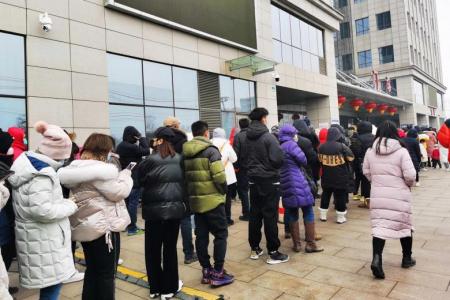Beijing grapples with Covid-19 flare-up with just over a week to Winter Olympics
BEIJING - At the Aerospace Centre Hospital in Beijing's Haidian district on Monday (Jan 24) morning, a long queue with nearly 300 people has formed, snaking its way around the building, across a parking lot towards a shipping container that has been converted into a mobile Covid testing centre.
Wrapped in heavy down jackets because of the January chill, most of those in line were complying with an order to get tested for Covid-19 after records showed that they had bought cold medication or cough mixture in the past 14 days.
Just over a week to go before the start of the Winter Olympics and the world's attention on Beijing, the Chinese capital is now grappling with a Covid-19 flare-up.
City officials are walking on a tightrope - having to contend with putting a lid on the growing outbreak without resorting to the usual playbook of harsher measures including a full lockdown.
During a press briefing on Monday, Beijing health authorities reported nine new local cases, bringing the total number in the current outbreak to 52, most of whom were involved in cold chain logistics and their close contacts, and infected with the more deadly Delta strain of the coronavirus.
Authorities have imposed a lockdown on several residential districts, including the Wanliuyuan residential compound in Fengtai district southwest of the city.
"While the epidemic situation in Beijing remains serious and complex, all departments across the city have been actively mobilised, speedily preventing the spread (of the virus), and the overall situation is controllable," deputy head of the Beijing propaganda department Xu Hejian told the briefing.
The city's government has since last month discouraged people from travelling out of the capital and last week implemented a rule that anyone returning needed to present results of a nucleic acid test done within the past 48 hours. They are also required to get tested again within 72 hours of arriving in Beijing.
There is concern, however, about asymptomatic cases circulating in the community since the city reported the first instance of the less severe but highly transmissible Omicron variant two weeks ago.
Health officials have blamed overseas mail as the source for the variant and are continuing to mass disinfect parcels while telling the public to reduce their international shopping. Those who have received goods from outside China have reported their health tracking kit alerting them that they could potentially be at risk of Covid-19.
The Straits Times has seen notices sent to several residential compounds in central Beijing popular with foreigners ordering people to undergo testing because some of their neighbours had recently visited Fengtai.
The authorities are also targeting those who recently bought medications for cough, cold and fever. During a previous outbreak in October, several people had tried to self-medicate after exhibiting symptoms of Covid-19, even going on to play mahjong with friends.
China is the last major country in the world still pursuing a "zero-Covid" policy with its borders still largely shut to foreigners and every case triggering a slew of stringent measures including centralised quarantine for close contacts.
Minute details like one's movements in the fortnight leading up to a positive Covid test are also released in the media. One such announcement provided Beijingers with a glimpse of those who keep the city running regardless.
Contact tracing showed that a 44-year-old man, identified only by his surname Yue, worked at 27 different work sites and garbage collection centres over two weeks, beginning only at midnight.
Netizens dubbed him the "hardest-working person among the floating population" - a hashtag that amassed over 60 million views on social media platform Weibo - drawing attention to deep inequality in China.
But, for now, residents are just worried that even harsher measures could be implemented in the city that has enjoyed relative freedom since early 2020.
"I bought some cold medicine because it's winter and I was having a runny nose, which is common, but now I have to stand in the cold to get tested," said Miss Jenny Deng, 22, who was in the queue near the Sanlitun shopping district just after lunchtime.
"The rules are changing all the time and I don't really understand all of them. But we have to comply, I suppose."
- Additional reporting by Lina Miao
Get The New Paper on your phone with the free TNP app. Download from the Apple App Store or Google Play Store now


